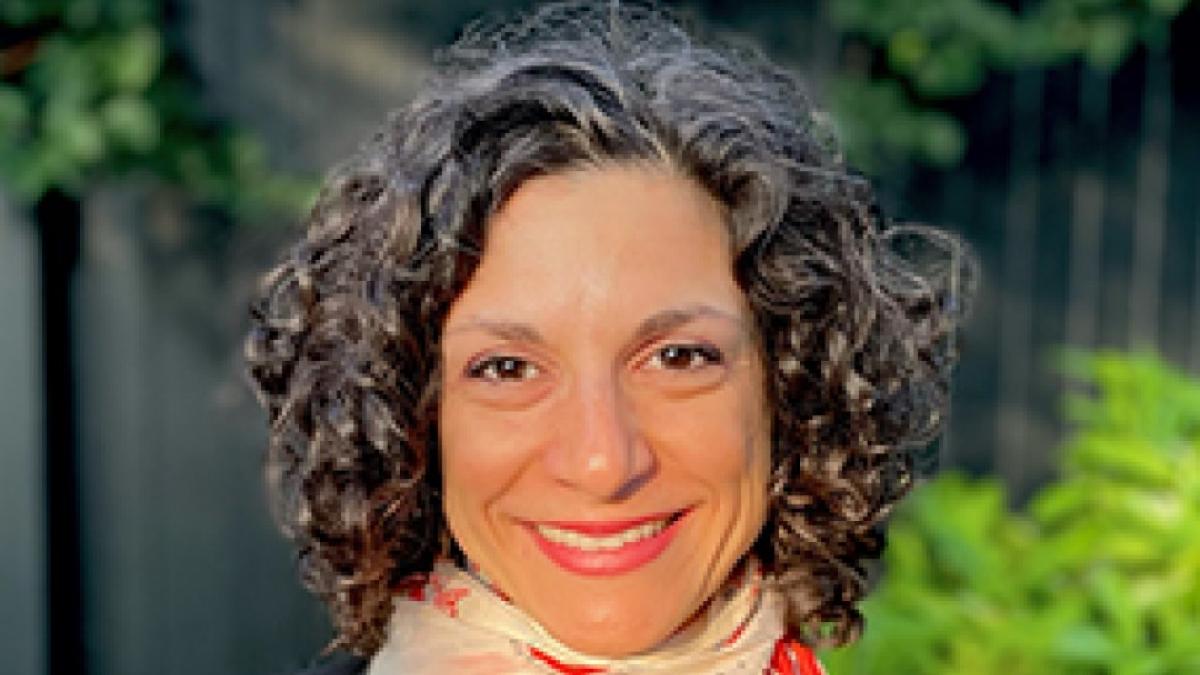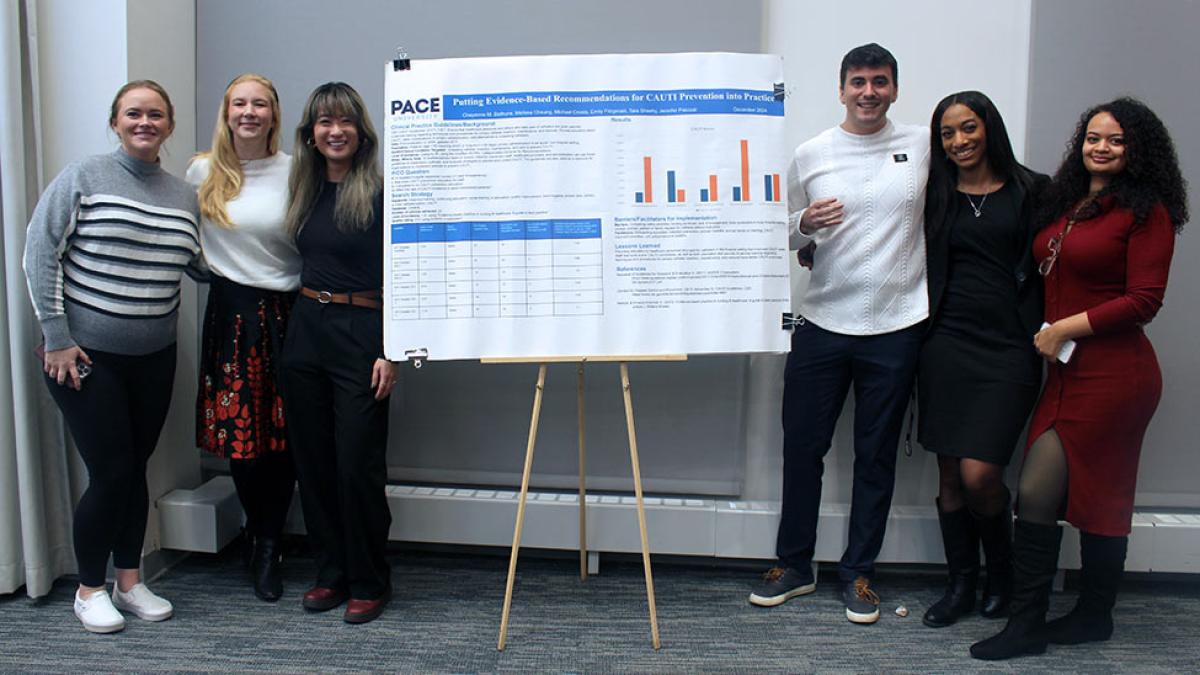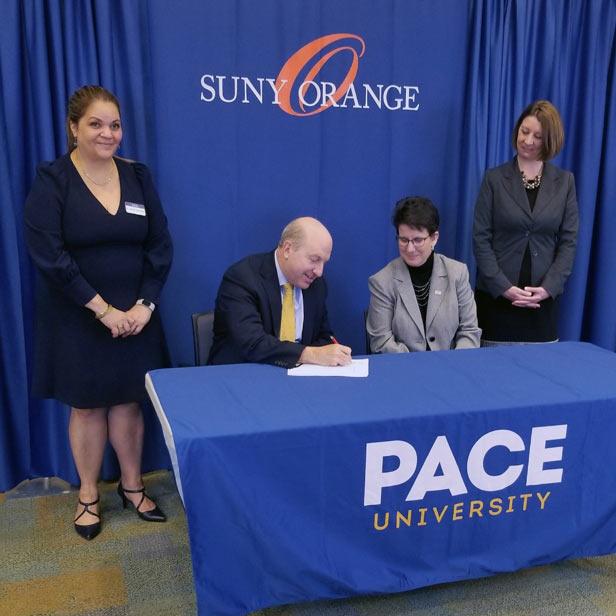
SUNY Orange and Pace University sign transfer agreement
An agreement signed on Monday between SUNY and Pace University, with its main campus in Lower Manhattan, enables guaranteed acceptance and junior standing at Pace for SUNY graduates who have at least a 2.5 grade point average.
Pace University, SUNY Orange Sign Transfer Agreement
Orange County Community College (SUNY Orange) and Pace University have jointly approved a transfer agreement that provides a seamless and smooth pathway for SUNY Orange graduates to transfer to Pace and remain on track to earn a bachelor’s degree in four years. The schools announced the agreement on March 28, 2022 at SUNY Orange.

Graduating Students from SUNY Orange Will Receive Guaranteed Acceptance and Junior Standing at Pace
Orange County Community College (SUNY Orange) and Pace University have jointly approved a transfer agreement that provides a seamless and smooth pathway for SUNY Orange graduates to transfer to Pace and remain on track to earn a bachelor’s degree in four years. The schools announced the agreement on March 28, 2022 at SUNY Orange.
For qualifying SUNY Orange graduates who successfully complete their associate’s degree prior to enrollment at Pace, the university will provide guaranteed admission with junior standing. For their part, SUNY Orange graduates must have earned at least a 2.5 grade point average while at SUNY Orange and must enroll full-time in one of Pace’s 18 bachelor’s degree programs included in the articulation agreement.
Pace will apply up to 68 credits earned at SUNY Orange toward the completion of the articulated bachelor’s degree programs. Students graduating with an Associate of Arts or Associate of Science degree shall be deemed to have met Pace’s basic general education/core requirements and will not be required to take any additional general education/core courses. Transferring SUNY Orange graduates with an Associate of Applied Science degree may, however, have to complete additional general education or core requirements at Pace.
“We are excited to join with Orange County Community College in this forward-looking agreement,” said Pace President Marvin Krislov. “This partnership will allow us to help Orange County students achieve their dreams, and it will deepen the relationship between our two institutions. We are eager and excited to continue providing all our students with opportunities to succeed.”
“I am so pleased to have been able to collaborate with Pace on this articulation agreement and am excited about the opportunity this expansive arrangement offers SUNY Orange students and graduates,” said Dr. Kristine Young, SUNY Orange president. “Students can begin or reinvigorate their college career here at SUNY Orange, earn an associate’s degree with us, transfer to Pace with junior status and continue their studies at a high-quality four-year university close to Orange County. This is just another example of the extraordinary access and affordability we can create in higher education when institutions build partnerships that serve the best interests of students.”
“Providing students with opportunities to pursue higher education, reach their potential and achieve their goals are guiding principles at Pace,” said Pace Provost Dr. Vanya Quiñones. “This agreement with Orange County Community College will be a transformative experience for students and creates a clear pathway for success. We’re eager to be partnering with our neighbors across the Hudson River to make this agreement a reality.”

Pace offers a diverse selection of learning and living experiences, including bachelor’s, master’s, and doctoral programs in more than 150 majors and programs through six schools and colleges—the College of Health Professions, Dyson College of Arts and Sciences, Elisabeth Haub School of Law, Lubin School of Business, School of Education, and Seidenberg School of Computer Science and Information Systems.
Each program at Pace is enhanced by the university’s metropolitan New York location. The New York City campus in Lower Manhattan is within walking distance of Wall Street, South Street Seaport and the Brooklyn Bridge, and a subway ride from all that the city has to offer. A bucolic 200-acre Pleasantville campus in Westchester County is home to 14 NCAA Division II teams, and the Elisabeth Haub School of Law is situated in the heart of White Plains.
Pace University
Since 1906, Pace University has educated thinking professionals by providing high quality education for the professions on a firm base of liberal learning amid the advantages of the New York metropolitan area. A private university, Pace has campuses in New York City and Westchester County, New York, enrolling nearly 13,000 students in bachelor’s, master’s, and doctoral programs in its Dyson College of Arts and Sciences, Lubin School of Business, College of Health Professions, School of Education, School of Law, and Seidenberg School of Computer Science and Information Systems.
Practice Makes Perfect: An International Effort
Pace’s Willem C. Vis International Commercial Arbitration Moot Team Pre-Moots with Numerous International Teams ahead of spring competition
Pace’s Willem C. Vis International Commercial Arbitration Moot Team Pre-Moots with Numerous International Teams ahead of spring competition
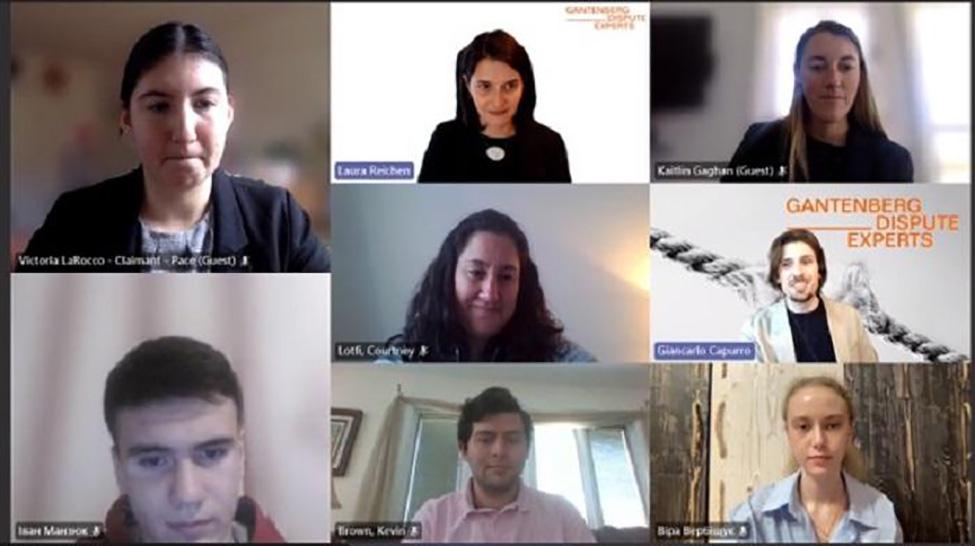
Over the past two decades, the Willem C. Vis International Commercial Arbitration Moot and its associated events have become the world’s leading forum in the fields of international sales law and international arbitration. The Moot was founded at the Elisabeth Haub School of Law at Pace University in the early 1990s and is named in memory of the late Professor Willem C. Vis, who was a member of the Pace faculty for many years. Haub Law is proud to remain a member of the Moot Board of Directors, and is one of only six law schools to have competed in the Moot each year since its creation.
This year, Pace’s Vis Moot team is made up of Kevin Brown (2L), Ashley Corbin (2L), Kaitlin Gaghan (2L), and Victoria LaRocco (2L). Since 2005, Adjunct Professor Linda Wayner has coached Pace’s Vis Moot team and in 2013 alumna Bryn Goodman began coaching the team as well. As part of the lead-up to the actual Moot this year, a series of pre-moots amongst both national and international teams has taken place. The Pace team competed in the Fordham University Law School practice moot, International Chamber of Commerce (ICC) practice moot, New York City Bar Association practice moot, and Galicia Pre-Moot. Additionally, the Pace team has also independently reached out to other Vis teams through social media to set up practice moots. Pace has had the opportunity to practice with Ukrainian Catholic University of Lviv, Beijing Institute of Technology, Bucharest University, Maaastricht University, University of Vienna, University of Goettigen, Copenhagen University, Gujarat National Law University (India), Benjamin N. Cardozo School of Law, Universidad Francisco Marroquín (Guatemala), and Notre Dame.
The Vis Moot is a simulation of a commercial dispute between private parties located in two different countries. The primary source of substantive law is the United Nations Convention on Contracts for the International Sale of Goods. Procedural rules vary from year to year. Teams write memoranda in support of the legal positions put forward by both Claimant and Respondent, and then present oral arguments in a series of qualifying and elimination rounds historically held each spring in Vienna. The Moot has been remarkably successful over the years, growing rapidly to include teams from nearly 400 law schools in almost 100 different countries. Last year, there were 387 teams with the Pace team making it to the top 32 teams in the Competition.
Coach Bryn Goodman notes, “The practice moots are an integral part of the moot experience. This year’s team are all stellar oral advocates who are heavily involved in the school’s trial ad program, participated in advanced appellate advocacy, and have been proactive about reaching out to foreign teams to schedule practices. The Vis Moot program entails writing two briefs in the fall (for Claimant and Respondent) and then participating in oral argument in the spring. Prior to the Competition’s general rounds the team will participate in a dozen or more formal practices with other teams. This enables the team to really develop their argument because live arbitrators who are practitioners in this field, former mooties, or coaches, informally judge the rounds and give the students feedback. The practices are not only an opportunity to hone the argument and practice being responsive to the arbitrators and your opponent, they are also a chance to connect with other students who have been grappling with the same legal issues as you since the fall. These practices create bonds between the students that often last long into their professional career and often create opportunities to connect with practitioners who are arbitrating the practice rounds.”
This year’s Competition will be virtual once again, with the opening ceremony to take place on April 8, general rounds from April 9-12, elimination rounds on April 13, and the final round and closing ceremony on April 14.
About this year’s Pace Vis Moot team:
Kevin Brown: Kevin participated in the Wechsler National First Amendment Moot Court Competition and reached the octofinals. Kevin also participated in the 2021 1L Lou Fasulo Moot Court Competition and reached the Top 16 in the 2021 AAA Moot Court Competition.
Ashley Corbin: Ashley participated as a shadow member on the school’s mock trial team for the In Vino Veritas Golden Gate National Mock Trial Competition team. Additionally, she participated in the AAA Moot Court Competition and was a finalist in the 2021 1L Lou Fasulo Moot Court Competition.
Kaitlin Gaghan: Kaitlin participated as a member of the of Haub Law’s arbitration team for the Tulane International Baseball Arbitration. She participated as a shadow member on the school’s mock trial team for the In Vino Veritas Golden Gate National Mock Trial Competition team. Kaitlin finished in the Top 16 of the 2021 AAA Moot Court Competition and was a finalist in the 2021 1L Lou Fasulo Moot Court Competition.
Vicky LaRocca: Vicky participated in the 2021 1L Lou Fasulo Moot Court Competition and finished in the Top 34. Vicky also competed in the 2021 AAA Moot Court Competition.
A Community That Values Entrepreneurship and Determination
Meet Sharai Hornedo '22, a graduate of Lubin's BBA program who is now pursuing an MBA in Marketing Management. Sharai appreciates the community and resources that Pace offers, and already has a job lined up after she graduates!
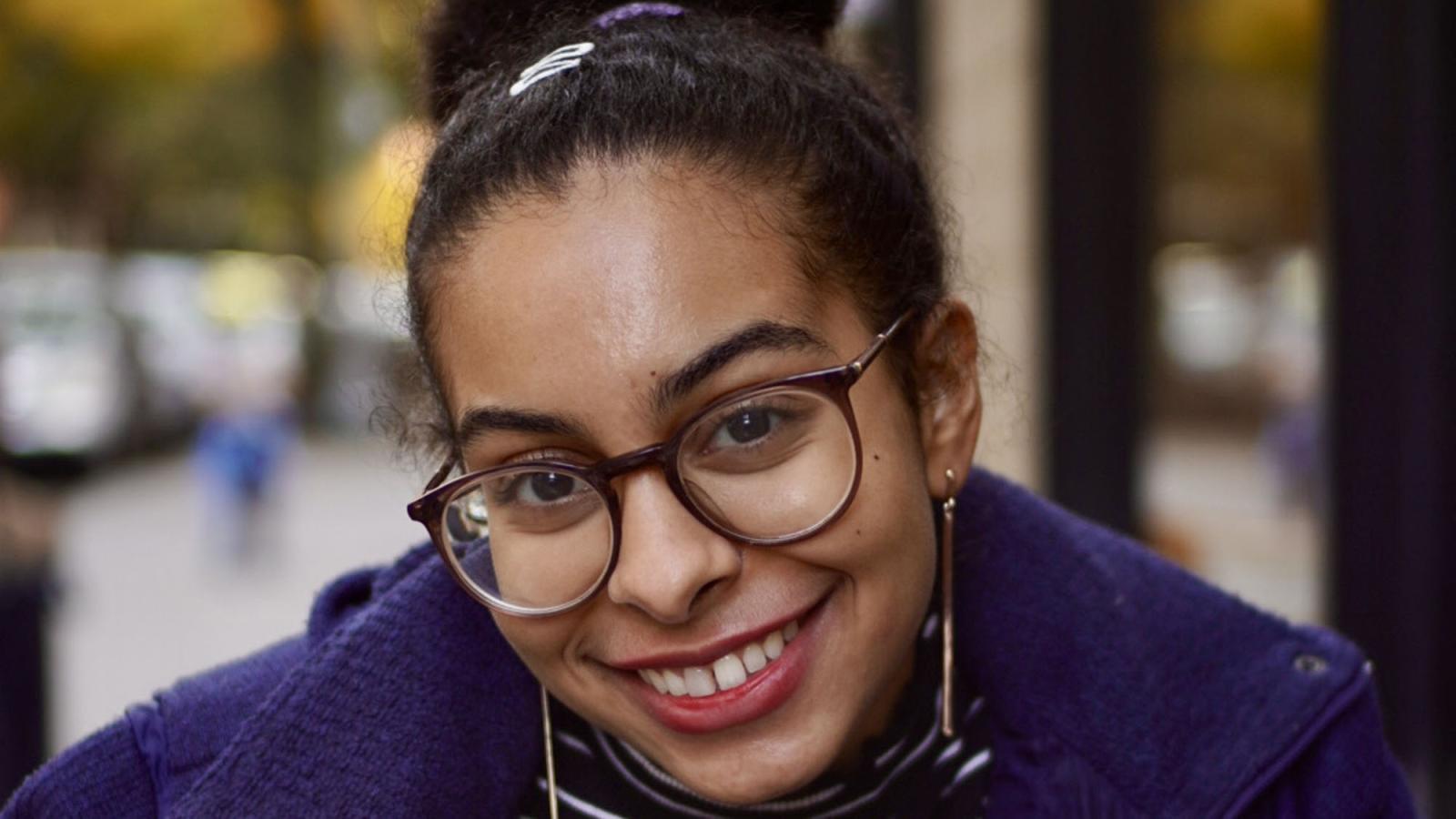

Sharai Hornedo
Senior Associate, Digital Activation - Programmatic, Hearts & Science
Class of 2022
MBA in Marketing Management
Member Of: The Strategy and International Business Club
Why did you choose Pace University and the Lubin School of Business?
I chose Pace because of its rich community of people. As a Lubin student, I've had the opportunity to make new friends who value entrepreneurship and determination as much as I do. During my time in the Marketing Management program, I was able to build relationships with my professors and enhance my skills for a future career in marketing. I also recently joined the Strategy and International Business club (SIB). Since Fall '21 was my first semester on campus, I wanted to make the most of my student experience. In the club, I was able to meet individuals who wanted to improve their skills as leaders. As someone who wants to be CEO of a marketing agency, I was delighted to meet like-minded individuals. I not only met people like me, but also had a community of people supporting me and my dreams.
As a Lubin student, I've had the opportunity to make new friends who value entrepreneurship and determination as much as I do.
What is it like to complete an MBA program so soon after receiving a Bachelor's degree?
Graduating in 2020 was a weird time since the world completely turned on its head. I originally was going to join the workforce, but I wanted to develop my leadership skills. That's where Pace comes in. I immediately joined the MBA program in Fall '20 when I had the chance. At first, it was strange to be back in school after the supposed end of my school (academic) career. However, I fell in love with the community and resources that Pace had to offer. Pace's Career Center has been a huge help as it has allowed me to connect with prospective employers. I am happy to announce that I already have a job lined up! I am excited to begin my career as a sales associate with Techtronic Industries.
Do you have any advice for other Lubin students looking to get involved on campus?
Of course! Anyone looking to be more involved should start by connecting with fellow classmates. My involvement with SIB started when one student connected me with the club's VP. Building relationships with others is something that will enhance every life experience. All it takes is one hello.
What does #LubinLife mean to you?
#LubinLife is not just a student experience, but a state of a mind. Being a part of Lubin shows that I am now part of a group of leaders who may change the world. I take pride in being a Lubin student since I know I will always have Lubin's values of strength and integrity with me.
Fabiola Robles: A Woman in the Law
Born in Ecuador and raised in Queens, Fabiola Robles is a first generation college graduate and will be the first in her family to obtain a law degree.
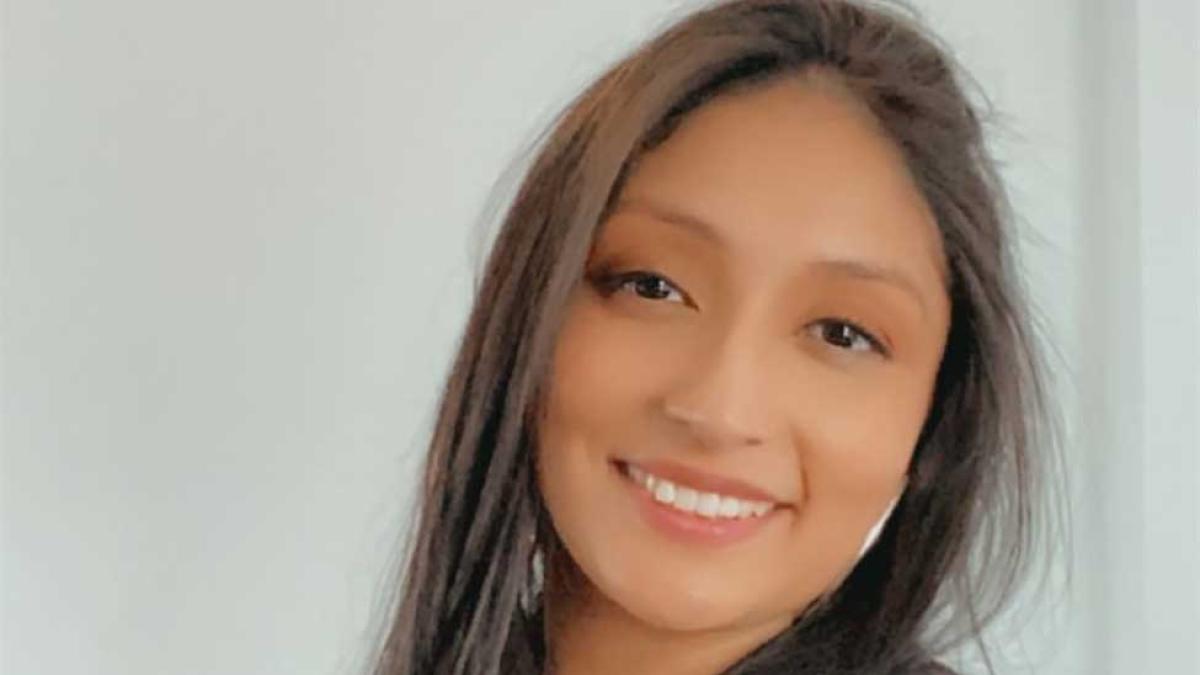
Born in Ecuador and raised in Queens, Fabiola Robles is a first generation college graduate and will be the first in her family to obtain a law degree. Fabiola grew up with four older sisters who have had a significant impact on her outlook and drive. “To be a woman in the law, for me, signifies advancement and accomplishment. We have come so far, but we have a long battle ahead as we continue to fight for equality, not just for women, but for other marginalized groups. As I continue throughout my career, they are the women who I keep in mind, as they are some of the strongest, hardworking, dedicated, and focused individuals I have ever met in my life. They are my inspiration. I have witnessed them face several obstacles and overcome them. There are not enough words to do justice how great and inspiring they are to me, all I will say is if I can be half the woman they are, I would be happy.”
Studying at John Jay College, the more exposure Fabiola gained to the legal field the more fascinated she was with it. Fabiola notes that, “After graduating from John Jay, I worked at a law firm and met many attorneys who served as my mentors and helped me gain more exposure to different areas of law, which solidified my decision to pursue a law degree.”
Since starting her law studies at Haub Law, Fabiola has taken a variety of courses with different professors, but it is Professors Bridget Crawford, Bennett Gershman, and Noa Ben-Asher who have had the biggest impact on her. “I am taking the Feminist Legal Theory Seminar right now with Professor Crawford and the most interesting thing to me is the definition of feminism and what it means to be a feminist. Throughout the course, we have read about different perspectives of pioneers of feminism, and it is fascinating to see their different approaches and views on feminism. The course has opened my eyes to think differently about my approach to certain topics, it has made be more mindful and aware about my own feelings and beliefs, and how each feminist theorist may analyze my opinions. Overall, it has been a very rewarding class.”
With graduation impending in May, Fabiola’s immediate goal is to study and pass the bar exam. As far as advice for future law students, Fabiola states, “You have to want it. In my opinion, saying law school is hard is an understatement. While the work may be doable, there will be times you want to give up, those are the moments that will really test your dedication, and the only thing that will get you through is your desire to accomplish your goals, your drive to get that degree. So, my advice is you have to want it. If you want it, that drive, that motivation, that desire, your dreams and your goals, will get you through every single time.”
PUPPY LOVE: Prison program uses therapy dogs to help inmates become better parents
Pace University professor Dr. Kimberly Collica-Cox runs the program. "As we know, family tends to be the No. 1 factor in helping to reduce recidivism to provide support when people are released. It also helps to reduce future intergenerational offending patterns for their children," she says.

The Language and Culture of Finance
We sat down for a Q&A with Aron Gottesman, PhD, Professor and Chairperson of the Finance and Economics Department, who joined Pace 20 years ago. We learned about his research interests, teaching methodology, and the "language and culture of finance."

Faculty Spotlight: Aron Gottesman
Finance and Economics Department
We sat down for a Q&A with Aron Gottesman, PhD, Professor and Chairperson of the Finance and Economics Department, who joined Pace 20 years ago. We learned about his research interests, teaching methodology, and the "language and culture of finance."
Why finance?
Finance is a sophisticated area of investigation that involves the language and culture of finance, the ability to think abstractly and comprehend challenging concepts, and the application of quantitative analytics.
Why Lubin/Pace?
Geography: If you can make it here (New York), you can make it anywhere! Also, proximity to the most important financial institutions provides tremendous opportunities to learn and teach the application of theory to practice.
Finance is a sophisticated area of investigation that involves the language and culture of finance, the ability to think abstractly and comprehend challenging concepts, and the application of quantitative analytics.
What are your research interests/areas?
Performance measurement; the role of personality in decision making; investment products and investing strategies; and financial institutions.
Why is it important to advance research in these areas?
Research can provide important insights that help direct better decision making. For example, my coauthor and colleague Matt Morey and I recently published a paper showing that certain performance measures, known as capture ratios, are not particularly informative or useful.
What do students learn in your classroom?
They learn the language and culture of finance and learn that they can obtain knowledge of the topics we learn with total comprehension.
Tell us about your professional path and its impact on how you teach and what you teach.
My academic education including both finance and psychology. This exposure to multiple disciplines allows me to understand the mindset of students from a variety of backgrounds and helps me make sure their learning experience is meaningful.
Of which triumph are you most proud?
I'm happily married with a wonderful family!
What is the single most important lesson you'd like to impart to your students?
Don't be afraid to ask questions and take risks!
What does #LubinLife mean to you?
Lubin is a school that equally weighs teaching and research and the application of each to the other. As a business school located in such an important location (the heart of the Financial District), the excitement of the city inspires us every day.
Courses Dr. Gottesman teaches:
Undergraduate:
Graduate:
Mentoring Young People Can Change Lives And Change Communities—and America Needs Many More Mentors
I’m a big believer in the power of mentorship. I know I’ve benefited from the support and wisdom of mentors. And, as I’ve written before, I’ve seen how that kind of coaching and support can be both a big benefit for college students and a benefit to those who serve as mentors, too.
Puppies In Prison
Those pets might not be here for another month because they first need approval from the CDC are speaking tomorrow, 8 inmates in Westchester County jail will be graduating from a new program as part of a partnership with Pace University. We'll have more information on the graduation ceremony tomorrow right here on News12.
Biden Supreme Court nominee faces big climate questions
“We’re now seating justices who are going to be steering the ship as we deal with increasingly disruptive climate effects,” said Katrina Fischer Kuh, an environmental law professor at Pace University’s Elisabeth Haub School of Law. “These are the justices who will be guiding our legal response to all of the impacts we’ve known are coming for a very long time but that seem to be manifesting more quickly and with greater severity.”
